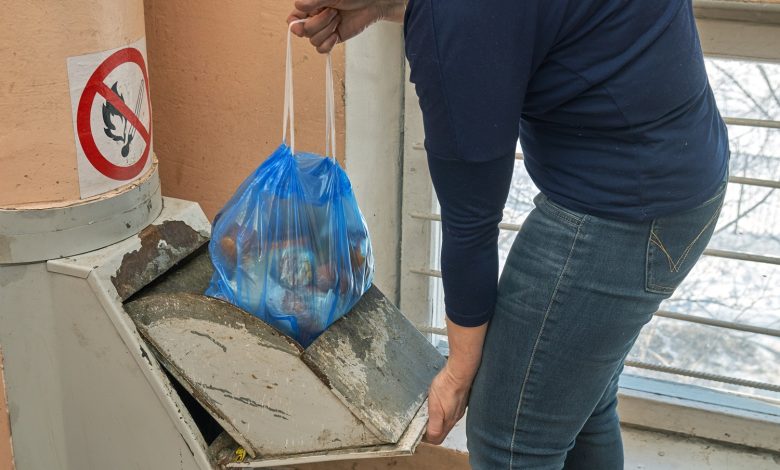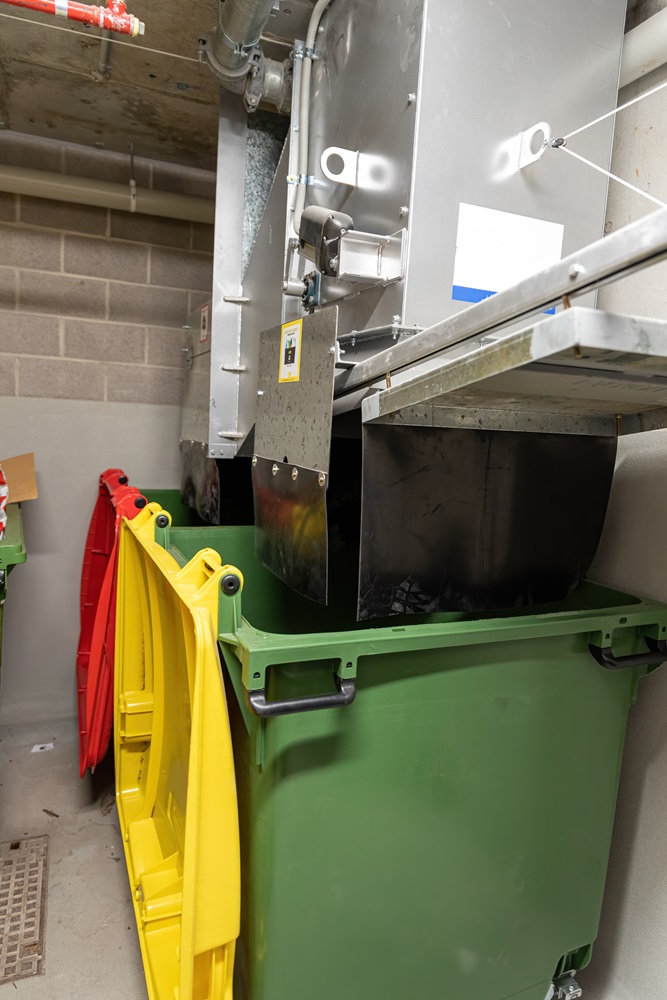
Open air & transparency solves rubbish conflicts in strata
Bin management is more than just a matter of tidiness - crucial in stopping the spread of harmful bacteria but also prevents conflict
Waste management might sound like a load of old rubbish for many people, but it’s a crucial issue for the management rights industry and anyone living in strata.
Industry leaders say it’s vital that resident managers understand all the requirements around disposing of refuse at their property when they sign their agreements, or they could face significant sacrifices in time and money.
Article originally published in Resort News – subscribe HERE
Read the latest AccomNews print issue HERE
Chris Irons, the former Queensland Body Corporate Commissioner, says property owners who treat waste management as a waste of time could see their property values decrease significantly if problems over refuse are not addressed.

Mike O’Farrell, one of Australia’s leading management rights experts, says waste management – bin room and waste chute sagas, people putting the wrong rubbish in the wrong bins, and waste smells, are constantly vexing issues for resident managers at both short-stay and residential buildings.
Mr O’Farrell has spent 33 years in the Management and Letting Rights (MLR) industry, owning and operating bodies corporate schemes and strata title buildings, including South Brisbane’s Riverside Hotel. He also runs MLR Services, which helps resident managers control their businesses. Mr O’Farrell says the problems over waste management are exacerbated by developers not allowing “the space or the necessary tools for the entire exercise of waste management to be 100 percent successful.”
He urged anyone entering the MLR industry to carefully study their agreement to ensure they were fully aware of all the waste management duties they were required to perform.
“A lot of these caretaking agreements are not written as site-specific; they’re often generic agreements and they’ll be written by someone in an office who hasn’t been on the site and is not familiar with what they are dealing with,” Mr O’Farrell said.

“You have an inevitable catch-up where, because of space restrictions and the cost of building, there is never enough space or adequate facilities applied towards waste management. Also, I very rarely see an agreement that fully encompasses the jobs to be done.
“You also have councils and pick-up arrangements and organisations that all do it differently. You can even experience differences with contractors in the same scheme. One contractor might be prepared to jump out of the truck and move a bin, and another might say ‘stuff it.’
“In terms of the waste chute in high-rise buildings, (although many bodies corporate don’t want to know about it) one of the major issues is regular cleaning. An even bigger issue is getting people to take note of what they can and can’t put down the chute.”
Mr O’Farrell said he was recently in a complex “where the garbage chute was disgusting, and the garbage room even worse”.
“While we were standing there, we hear ‘boom, boom, boom’ – it’s a hurled bottle and it smashes at the bottom. This is very dangerous if you happen to be in the bin room at that moment.”
“Often, people tip open packets of food, like stale yogurt down chutes. So, in many buildings, you have all kinds of issues; dangers, offensive smells, and a general mess.”

Mr O’Farrell said the problem of waste management was not as pronounced in “high-class residential buildings” when most of the units were owner-occupied. Owners that care about their building, he said, would almost always be very conscious of waste management and how it’s treated.
“But when you have these multi-purpose buildings with all manner of people, owners, tenants, and guests – that’s where you have more issues,” he said.
“You can’t stop certain people doing the wrong thing no matter how much you ask. And it’s not just holidaymakers, it’s residents and tenants because very few people give the issue of rubbish chutes the attention it deserves.
“The stress from this on managers at holiday time is enormous.
“When I was working at the ‘coalface’ in buildings back in the 1990s, you always organised extra bins, extra pickups, and extra clean-ups over the peak period. A good manager should organise approval in the yearly budget to clean the garbage chute regularly because that’s where a lot of health and safety issues arise.”
Furthermore, Mr O’Farrell said incoming resident managers should always ensure waste management protocols are covered at the contract stage of their purchase. “When you’re looking around a property, before even purchasing the management rights – that’s the best time to check these issues are in the agreement,” he said.
“The buyer must raise these issues at the assignment meeting. Ask, ‘what is the policy with rubbish?’ Ask, ‘what are the manager’s responsibilities’ and ‘what’s in the budget for that?’”

Waste management is a pressing issue in all strata buildings, not just those under management rights. Clean bins elevate community living, especially when sharing small common spaces. Maintaining clean, fresh bins is a key factor in preserving the health and harmony of a strata community.
Regular bin cleaning is more than just a matter of tidiness – it’s crucial to preventing the spread of harmful bacteria in a community where residents live in proximity.
Foul odours from neglected bins create an unpleasant environment and encourage the breeding of unwanted insects and rodents.
On the other hand, clean and well-maintained bins make for a visually appealing environment creating a sense of pride and community spirit in a well-run property.
By choosing eco-friendly cleaning methods, strata communities can also help with recycling and other efforts to reduce environmental impact.
Chris Irons, who now runs Strata Solve, Queensland’s leading strata dispute resolution and problem-solving firm, says that while waste management is the least appealing aspect of working and living in strata, owners who neglect addressing waste management issues face a significant hit to their property values.
A well-maintained strata property, with clean and fresh bins, not only enhances the lifestyle of residents but also the value of the property to potential buyers as a place of health, happiness, and community spirit. Overflowing bins and bad smells can be a death knell to property prices.
Mr Irons said problems with waste management at a strata property could potentially reduce the price of lots significantly. From a legislative perspective, the body corporate must manage the common property, and there are specific provisions around things such as nuisance and hazards – and that involves things like maintenance and smell because bins can be a health hazard,” Mr Irons said.
“Often disputes over bins and maintenance come down to a lack of understanding – if you move into a high-rise building, you might assume that someone else takes care of all the rubbish provisions.
“Perhaps they do, and maybe the onsite manager or caretaker is engaged to do that. But that is not always the case.
“A good resident, whether an owner or tenant, will not want to see bins overflowing and the rubbish collection area in disarray. But not everyone is of the same mind.
“If I had one message for everyone living in strata it’s to man-up and take out the bins and put them back when the rubbish has been collected. Oftentimes people, even owners, are lazy and expect their neighbours to pick up after them. They assume the rubbish is someone else’s problem.
“It defies belief that people are living in strata communities who do not engage in that community even though it means they are missing out on an obvious personal and commercial benefit.”
In October, Queensland’s Office of the Commissioner for Body Corporate and Community Management had to tell owners of a strata lot at North Lakes they were in contravention of scheme by-laws and that they had to:
- Ensure that their garbage bins are returned to the correct storage position within 24 hours of when the garbage is collected.
- Ensure that their garbage bins are stored within their lot, and not on common property.
- Ensure that they do not dispose of garbage in a way that adversely affects the safety, hygiene, health, or comfort of other owners and occupiers.
This includes not disposing of garbage on common property, including cigarette butts or overflow from garbage bins, and ensuring that cigarette butts are cleaned up in the property gardens/common gardens at the front and back of (their property).
It was a long and involved arbitration process over what should have been simple requirements of neighbourliness.
Trevor Rawnsley, the CEO of ARAMA (Australian Resident Accommodation Managers Association) says one of the great benefits of management rights for any scheme is to have someone managing the rubbish maintenance rather than leaving it to individual owners.

“But anyone entering the industry must know exactly what’s involved when it comes to waste management in their agreement,” he said.
“Some schemes have 200 lots, and that might involve putting out 400 bins a week – general refuse and recycling.
“Some people new to the industry don’t understand the requirements and might sign a generic agreement without realising how much work they have to do regarding the bins and waste management. Sometimes it comes as a big shock to them.
“It’s essential that any new manager fully understands the contract that they are buying.”
Kelley Rigby, from Letts Rebuild, whose company helps resident managers grow their businesses, says open communication is the key to avoiding confrontations in most aspects of life, including strata communities.

“I know managers who have become embroiled in huge disputes over who is responsible for the waste chute.
“To me, it’s a commonsense issue that should be sorted in the agreement, with everyone compensated for the specified job,” Ms Rigby said.
“Unfortunately, in the walk-around, some don’t check what’s in the agreement and what’s expected close enough.
“Some agreements might be 20 or even 30 years old and don’t include the modern methods or requirements of waste management.
“It’s essential that everyone is open and transparent from the start. That’s what harmonious living should be.
“Anything else, as some residents and managers have found, can result in confusion, conflict, and a big stinking mess.”
Searching for a Management Rights business? AccomProperties HERE
Grantlee Kieza OAM has won three Queensland Media Awards, two Australian Sports Commission Awards and has been a finalist for the Walkley and News Awards and for the Harry Gordon Award for Australian sports journalist of the year. In 2019 he received the Medal of the Order of Australia for his writing. You can find more of his work in our AccomNews & Resort News print magazines.
He has written 22 acclaimed books, including bestsellers Hudson Fysh, The Kelly Hunters, Lawson, Banks, Macquarie, Banjo, Mrs Kelly, Monash, Sons of the Southern Cross and Bert Hinkler.







